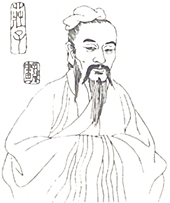Zhuangziis a book full of anecdotes, parables and metaphors and with a wonderful lyrical drive that makes it a classical of world literature. It is one of the classics of the Taoism.
 |
| Zhuang Zhou |
The life of its author named Zhuang Zhou (369-286BC) is quite unknown, and we only know that he, according to his teachings, refrained from governmental offices to pursue a private life of quietness, wiping off the desire to acquire knowledge and understanding. As a book full of contradictions (death or life is irrelevant, but death is deliverance; accentuating at mental calmness and at the same time recommending it harshly),
Zhuangziclearly shows the uselessness of trying to fix truth and reality. The only solution to make oneself free from the worldly problems would be to dematerialize oneself, and to dissolve the linkages of the subject to the world. Skepticism and nihilism are the tendencies that result from the impossible freeing from the self, an experiment that is possible by shamanist practices.
Zhuang Zhou said that nine tenths of the contents in his book were parables. Some of these parables were from ancient mythology, some were processed from folk legends but the majority were created by the author according to real life. The dramatis personae in the parables took much variety, including immortals, emperors, scholars, stooping old men, eagles, small birds, frogs, tortoises, butterflies and so on. Zhuang Zhou was good at describing animals and human figures in detail. In addition, he expressed his emotion all through the book.
Zhuangziis very influential in the history of literature in China. Nearly all writers of the past dynasties enjoyed some of its edification.
